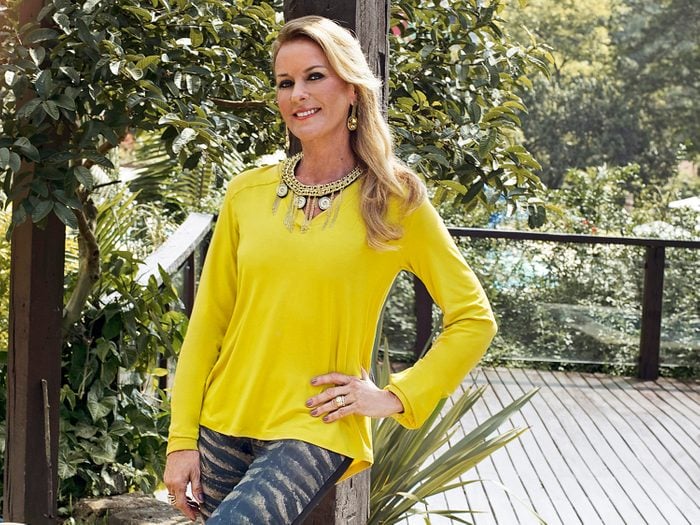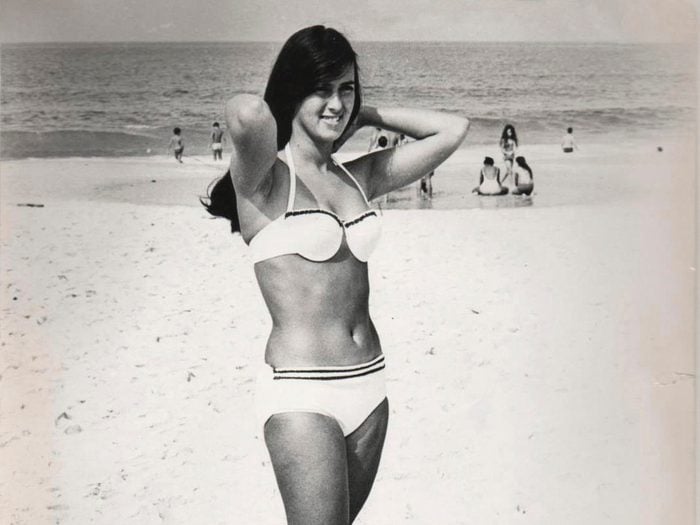
Just Who Was the Girl From Ipanema?
In the early 1960s, tall and tan and young and lovely Heloísa Eneida de Menezes Paes Pinto walked through the streets of Ipanema, sometimes toward the sea in a two-piece bathing suit made by her grandmother, and sometimes toward the bus station in her high school uniform. Little did she know that, at the corner of Montenegro and Prudente de Morais streets, in Bar Veloso, a pub popular with musicians and intellectuals, composer Antônio Carlos (Tom) Jobim would fall for her beauty and, inspired by her swaying hips, would later write, along with poet Vinicius de Morais, “Girl from Ipanema,” one of the most recorded tracks of all time. Heloísa was 19 when it was written. Now 70 (as shown here), Heloísa Pinheiro (she married Fernando Pinheiro in 1966) recently spoke to Reader’s Digest about how the song changed her life.
When did you learn that you were “the” girl from Ipanema?
One day, photographer Yllen Kerr, for whom I had posed as part of a magazine article on the youth of Ipanema, told me: “I’ve just met Tom and Vinicius at Bar Veloso, and they told me they wrote a song for you.” I didn’t believe him. I thought, If that’s true, why me? I’m an ordinary girl. My Mum says my legs are too thin, my Grandmother calls me “knife faced,” because I have this long face…. I didn’t see myself as a great beauty.
In 1965, the song became an international hit after being awarded a Grammy for Record of the Year, and everyone began wondering: “Who inspired the song?”
Vinicius and Tom were a bit afraid of declaring publicly that I was their muse because my dad was in the military, and those were dictatorship times, but a few Brazilian journalists insisted: “You must tell theworld.” A lot of people thought their muse was Astrud Gilberto, the bossa nova singer who first recorded the track along with Stan Getz, and that encouraged Vinicius to finally reveal the truth. He wrote a letter to a magazine disclosing that I was the inspiration. My world turned upside down that day.

Did it take long for you to process everything that was happening?
I was extremely naive, and I couldn’t foresee the implications of the whole situation. Back then I was just happy: Wow! A song written for me! How lovely! That’s all. But it’s not how it went. It took me a while to realize that I had been the inspiration for a beautiful story.
Did this cause you any conflict?
Oh, I began thinking that I had to keep a sculptural body. The lyrics went like: “When she walks, she’s like a samba that swings so cool and sways so gently, that when she passes, each one she passes goes- ah.” I became instantly obsessed: Well, every time I walk, I’ve got to make sure that I swing and sway gently. Oh, and people will pay more attention to my body. I couldn’t put on weight, I couldn’t cut my hair short… I hoped everyone would look at me and say: “She deserves this title.”
Do you still feel this obligation?
I don’t take it too seriously anymore because of my old age. People should be able to see that aging is something inevitable. We’ve got to accept it.
After all, beauty isn’t everything. My parents used to say, “A person’s soul is what shines the most.” And my father always told me, “Honey, you should show respect and consideration for others.” This is how they raised me and I passed it on to my children. That’s the most important thing in life because life is a passage. If you do good here, maybe you’ll have a better afterlife.
Which role did your parents play in your professional journey?
I refrained from doing lots of things because they would go like, “Being an artist is not for you. They smoke, they drink, they have a wild lifestyle. Forget about it.” I was obedient and I wanted my parents happy. And this got in the way of some of my plans. Back then it was simply “no, you won’t.” End of story.
They were trying to protect you…
Exactly. Also, in the 1960s all Brazilian families hoped their daughters would become teachers and their sons would join the military.
So you were destined to be a teacher?
That’s what my parents had planned for me, and I even taught at a public school for a while. But deep down I knew I was born to be an actress. To be in the spotlight.
And you did star in a few soap operas. What made you change to TV host?
When I was acting in the soap operas, I noticed that my character didn’t grow. After a while I asked myself: What if I’m not that good as an actress? This is when I set this goal of becoming a TV presenter.
So now you’ve finally fulfilled your professional goal?
I’m more sure of myself and I’m doing what I love. It’s so rewarding when people come to me and tell me that they love my show. It is aimed at seniors, the age range I currently find myself in. In the show I talk about health, fashion, cooking. It’s all I wanted it to be. I also present another show at Fox Life with my daughter Ticiane, in which I teach older ladies how to do their make-up and hair style-it’s more to do with beauty. The shows complement each other.
Related features:
10 Beautiful Reasons to Visit Rio de Janeiro
10 Breathtaking Adventures in Rio de Janeiro
Top 10 Sexiest Places on the Planet